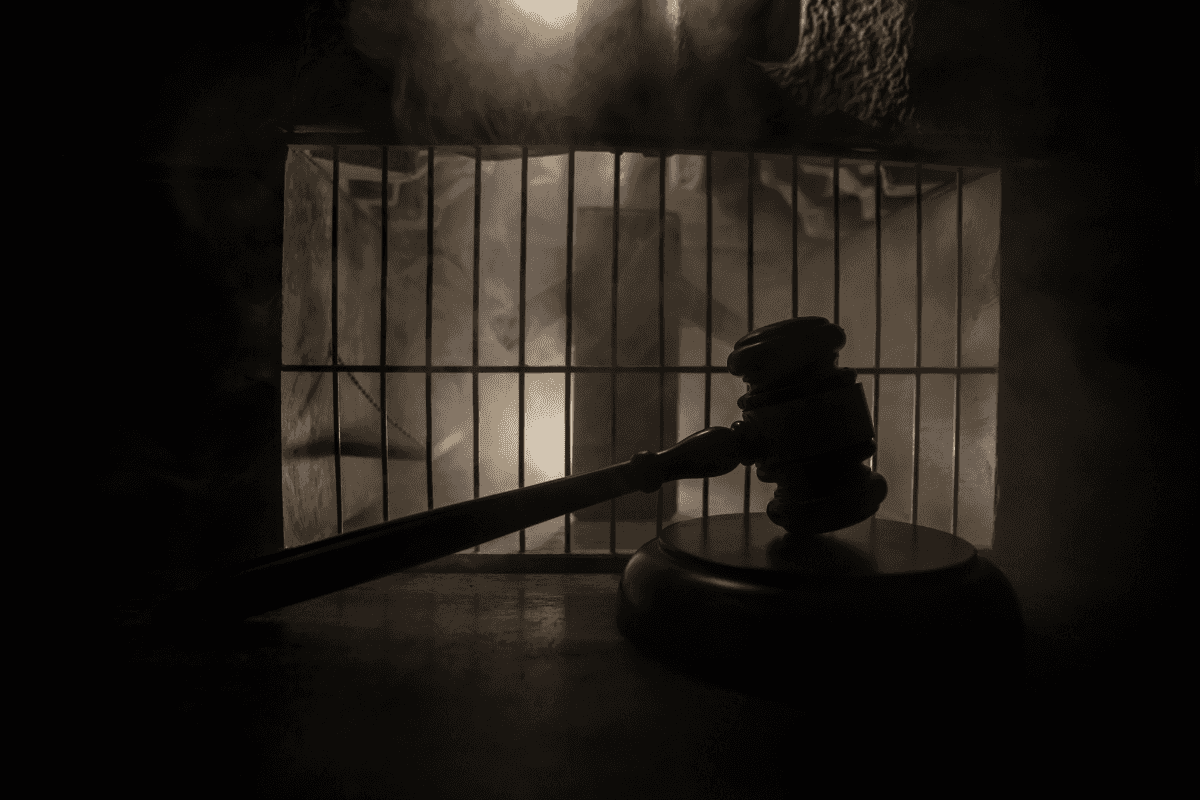Cyber blasphemy prosecutions continue in Pakistan as 3 more given death penalty
With the latest verdict, PECA-linked blasphemy death sentences have reached 11 since September 2024
Ali Hamza
Correspondent
Ali; a journalist with 3 years of experience, working in Newspaper. Worked in Field, covered Big Legal Constitutional and Political Events in Pakistan since 2022. Graduate of DePaul University, Chicago.

Shutterstock
A Pakistani court has handed down three more death sentences in cyber blasphemy cases -- part of a growing wave of controversial prosecutions that have sparked concerns over alleged abuse of religious laws and digital surveillance.
These cases are being tried under the Prevention of Electronic Crimes Act (PECA), a 2016 law originally intended to combat online harassment, hate speech, and cybercrime, but now invoked in blasphemy-related prosecutions too.
With the May 2 verdict by a local Islamabad court, the number of PECA-linked blasphemy death sentences has risen to 11 since September 2024, when Judge Afzal Majoka assumed charge of the special cybercrime court.
The rulings come amid heightened scrutiny, following disturbing revelations by the National Commission for Human Rights (NCHR) and the Punjab Police’s Special Branch, both of which have cast doubt on the credibility and motives behind several of these cases.
Pakistan, a country where speaking out against the blasphemy law has cost public figures—including former Punjab Governor Salman Taseer—their lives, is witnessing a surge in cyber blasphemy prosecutions. However, investigative reports suggest that many of these cases may be fabricated or manipulated.
Allegations of entrapment and collusion
According to the NCHR, 767 individuals were imprisoned on blasphemy charges in Pakistan between 2020 and July 25, 2024. The vast majority—581—were from Punjab, followed by 120 in Sindh, 64 in Khyber Pakhtunkhwa, and two in Balochistan.
A confidential Special Branch report titled “The Blasphemy Business”, dated January 24, 2024, and leaked to the media in July, alleged that a shadowy group known as the “Legal Commission on Blasphemy Pakistan” had been orchestrating a scheme to entrap young people in fake blasphemy cases.
The report further accused officials in the Federal Investigation Agency (FIA) in Rawalpindi and Islamabad of collusion in the racket, which allegedly extorted money from victims’ families.
In response, families of 101 individuals accused in cyber blasphemy cases have petitioned the Islamabad High Court, demanding that the federal government establish an independent inquiry commission to investigate the claims outlined in both the Special Branch and NCHR reports.
While the court initially ordered live streaming of the proceedings—led by Justice Sardar Ijaz Ishaq Khan ahead of Eid al-Fitr in April—the case was later reassigned to a two-member bench after the holidays. This transfer has since been challenged in court.
Court cites forensic evidence, dismisses defense claims
The three most recent death sentences were handed down to individuals arrested separately in June 2023 from Islamabad, Peshawar, and Faisalabad.
According to the written judgment by Additional District and Sessions Judge Afzal Majoka in the latest death penalties, mobile phones recovered from the accused were sent for technical and forensic analysis by experts from the Federal Investigation Agency (FIA).
Based on the analysts’ findings, the court concluded that the accused were directly linked to the alleged crimes. Judge Majoka said that the forensic reports clearly connected each of the three individuals to blasphemous activity and that the evidence was sufficient to prove the prosecution’s case "up to the hilt."
The judgment noted that investigators found the accused had been operating social media accounts under various aliases and engaging in group chats on messaging platforms, where blasphemous messages targeting Almighty Allah and other sacred religious figures were allegedly shared. The FIA forensic report confirmed that the offensive content included images, videos, and text, some of which were described as sexually explicit and intertwined with religious themes. These materials were said to have been disseminated via Facebook accounts, groups, and Messenger chats.
Judge Majoka also dismissed the defense’s claim that the FIA had planted incriminating data in the accused's messaging apps. He pointed out that the content in question had been shared on Facebook Messenger prior to the arrests, making it implausible that the agency could have tampered with the accounts afterward.
In response to another objection raised by the defense, the judge addressed a discrepancy between the Facebook links cited in the original complaint and those referenced in the forensic reports. He wrote that while the complaint referred to Messenger links, the forensic reports included full Facebook URLs, which matched the data retrieved from the accused’s phones.
Defense lawyers cry foul over trial fairness
Advocate Asif Tamboli, counsel for one of the convicts, told Nukta that the FIRs registered in cyber blasphemy cases across the country follow a disturbingly uniform pattern. "The allegations are identical, the content attributed to the accused is the same, the FIA's investigation process is the same, and so are the judgments," he said.
Tamboli added that the defense was not surprised by the death penalty verdict. "We had anticipated this outcome from the beginning, given the track record of judges handling these cases. This particular judge has never granted bail to any accused in a cyber blasphemy case since his appointment."
Tamboli further noted that he had attended 14 hearings and argued for nearly two hours at each session. "My only request to the judge," he said, "was to ensure that my arguments were reflected in the final judgment."
Advocate Tamboli further argued that the complainant failed to prove in court that his client had committed blasphemy. He said that his client was not a member of the groups where the alleged blasphemy occurred and had never shared any offensive content with the complainant.
He emphasized that his client had never tagged the complainant in any post, nor were they Facebook friends. Tamboli also pointed out that the prosecution lacked verification from the Pakistan Telecommunication Authority to confirm that the phone number linked to his client was actually his, or that the email accounts attributed to him were used to create the Facebook account.
Moreover, the Investigating Officer (IO) had admitted in court that nothing blasphemous was shared from his client’s legitimate Facebook account. He noted that the URL linked to his client was different from the one allegedly used by the accounts involved. According to Tamboli, these contradictions had been present from the very beginning of the investigation.
Tamboli further criticized the trial process, calling the testimonies and proceedings "false activities and a waste of time." He said, "The judge should simply award death penalties to accused persons the day after the FIR is filed, to save everyone’s time and resources."
Despite this, he expressed hope that the appellate court would offer some relief, though he acknowledged that only two appeals had been accepted by the Islamabad High Court (IHC), and the hearing dates had not yet been set.
Tamboli also shared that his client, a 24-year-old student at Faisalabad University at the time of his arrest, had been lured by the “Blasphemy Business Group” with promises of a job in Spain. Instead, he was arrested by private individuals and handed over to the FIA.
Complainant’s testimony raises new questions
Advocate Rizwan Haider, representing another convict, told Nukta that his client was a well-educated man, employed at an educational institute in Peshawar, and the father of three young children. Haider noted that his client had performed Umrah just four months before being framed in this case.
He emphasized that due process was not followed during the trial and that his client’s rights were ignored. “The judge’s conduct was prejudiced and biased,” Haider added. He pointed out that many doubts had not been resolved in favor of the accused, and the prosecution had failed to present evidence strong enough to warrant a capital punishment verdict.
Haider also described the trial environment as hostile, particularly due to the presence of lawyers from the Legal Commission on Blasphemy Pakistan -- a group that predominantly represents complainants in cyber blasphemy cases, headed by Advocate Rao Abdul Raheem.
“The judge did not create a fair atmosphere in the courtroom and exhibited clear bias throughout the proceedings,” Haider remarked. He confirmed that he would appeal the conviction before the IHC.
The third individual convicted in this case was an employee of the Frontier Constabulary.
The complainant, a clerk counsel (Munshi) for Advocate Rao Abdul Rahim, testified in court that he had been associated with Rao for the past 6-7 years. He acknowledged that the name on his Facebook account, Aarzu Nazakat, was that of his 6-year-old niece. His real name, he admitted, was Umar Khan, but he preferred not to use his actual name on Facebook.
In his testimony, Khan explained that he became aware of blasphemous groups after being added to various messenger groups. However, he could not recall who added him, when, or how many groups he had joined. He further stated that he had no knowledge of the group names, the identities of the administrators, or the total number of members in the groups.
Khan also testified that he surrendered his phone to the FIA at the time the complaint was filed, and it remained in their possession. He added, "When I handed over my phone to the FIA, my Facebook ID under the name Aarzu Nazakat was active on it. The phone is still with FIA. Later, when I submitted a second application, my Facebook ID had changed to Aarzu Shaukat. At that time, I still had the same phone, but I don’t remember when I created the Aarzu Shaukat Facebook ID."
According to court records, Khan admitted that he had never seen the original Facebook IDs of the three accused in the case.
Advocate Rao Abdul Rahim, when contacted by Nukta for comment, did not respond to the queries sent to him.







Comments
See what people are discussing